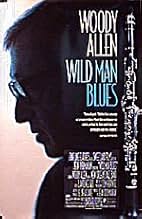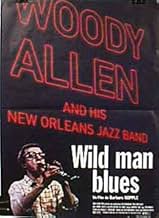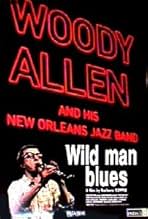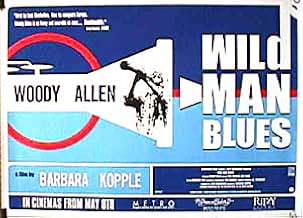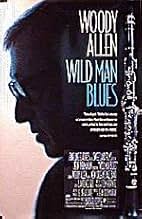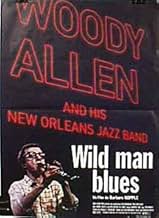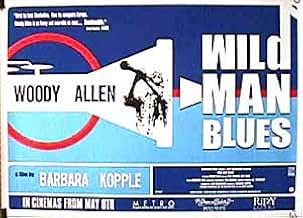Füge eine Handlung in deiner Sprache hinzuAcademy Award-winner Barbara Kopple directs this documentary portrait of Academy Award and Golden Globe-winner Woody Allen, seen traveling with friends and fellow musicians during their New ... Alles lesenAcademy Award-winner Barbara Kopple directs this documentary portrait of Academy Award and Golden Globe-winner Woody Allen, seen traveling with friends and fellow musicians during their New Orleans jazz band's 1996 European tour. Allen's relationship with his wife Soon-Yi Previn ... Alles lesenAcademy Award-winner Barbara Kopple directs this documentary portrait of Academy Award and Golden Globe-winner Woody Allen, seen traveling with friends and fellow musicians during their New Orleans jazz band's 1996 European tour. Allen's relationship with his wife Soon-Yi Previn is captured on film here for the first time, and others on the European jaunt include Alle... Alles lesen
- Auszeichnungen
- 4 Gewinne & 2 Nominierungen insgesamt
- Self
- (as Soon Yi Previn)
- Self - the Trumpeter
- (as Simon Wettenthall)
- Self (Guest in hotel suite)
- (Nicht genannt)
Empfohlene Bewertungen
I bought this film as a Woody Allen fan and as someone who, while not a fan, certainly enjoys a bit of old fashioned jazz music on a hot sunny night. For both these reasons I enjoyed this film, even though the description of it as a `documentary' is maybe not the most fitting as it implies a certain amount of probing into the subject. Rather than digging, Kopple basically just seems to point the camera and leave it running. She doesn't really ask any questions of Allen or his family and seems content to let him and his companions just talk freely - it made me wonder how many countless hours of footage she must have shot to come up with what she uses here. So if you are looking for insight in Allen then you won't get it here. Likewise, if you are looking for a great deal of discussion or insight into the music then you'll be let down; in this area Kopple also mostly just films the band playing.
That is not to say that the film is bad, because it isn't, but there isn't a great deal of substance to it unless you are Woody Allen fan. As a fan, there isn't a great deal of insight into Allen's life or situation - the conclusion we are left with is no more of an understanding than we started with, that he is a witty little man who is filled with little complexes and neuroses while also being a very private person. The value of the film is that we actually get to see that during the course of the movie. Allen is funny and quite relaxed but a `real' documentary would have pushed harder into the darker issues of Allen's life - many viewers will be annoyed by how the film just accepts Soon Yi without ever really asking any questions or even hinting at the many issues behind their relationship.
Overall I enjoyed this film but then I like Woody Allen's humour and was interested to seeing if his onscreen personae is similar to his real life character. However it isn't really insightful and it is only a scene near the end with Allen and his parents (yeah - I was surprised they were still alive too!) that gives a little background and is interesting. A light, witty and quite enjoyable film but I can't imagine that anyone other than fans of Woody Allen and jazz will get a great deal from this.
The occasional concert performances are pleasant enough, but they're not the most valuable elements of the movie; for most fans, things really come alive when we get to see Allen being himself behind the scenes: getting jittery while riding in his boat in Venice, getting grossed out at the thought of a dog licking his face, cautioning people at a press conference that he's claustrophobic, struggling with an uncooperative clarinet, and musing over the respect his films receive in Europe as opposed to their indifference at home. It becomes quite amazing to see firsthand just how much of his true persona is actually what he uses to flesh out those crazy characters he plays in all his films. Nowhere is it more evident just how Woody may have wound up so endearingly neurotic than it is when he returns home to New York at the end of the film. It's then that we meet his still-living parents who seem to do everything in their power to discredit him after his long trip; dad is more interested in the quality of the engraving on Woody's overseas awards rather than being complimentary toward the honor itself; mom reminds her son not to think he made it famous all on his own, and doesn't pull punches when she gives her opinion of Woody's choice of woman.
WILD MAN BLUES is not meant for just your average movie lover, but if you're a genuine fan of Woody Allen and his films, you really should catch it. *** out of ****
Allen's clarinet playing is variable. He seems to be having trouble with his reed throughout the tour. On good nights he sounds like a reasonable George Lewis imitator, on a bad night in Paris he could barely coax a note out of his instrument. The audiences loved him apart from a bejewelled invited audience in Rome that clapped politely and sat wearing bemused smiles throughout the performance
What I found most interesting was seeing Woody Allen as he really is which isn't much different from his characters in his movies. His interactions with people, his humor, his moods, his explanations of himself, seeing his interaction with his parents.
It was very real. Very human. Just what you'd expect from Woody Allen.
Some key quotes:
His wife, Soon yi said: "When she came to see you play, she said that's the most movement she's seen from you from the whole time she's known you."
Woody: "The most movement? What does she expect? I mean, I'm not gonna bob my head and tap my feet when I'm talking about politics or literature or something. I'm not going to keep time. Right? Be reasonable. I'm appropriately animated for a human in the context within which I exist."
Lady: "You are so intelligent. You are so happy to be so intelligent." Woody (jokingly): "Well, yes. It is a burden though sometimes. With this much intelligence comes great responsibility. You know. It's lonely at the top."
In the hotel restaurant walking around: "Oh, there's the band. Oh, my goodness, they're eating like their going to the 'chair'."
"Whenever I travel, I always have to have my own bathroom because I'm crazy. So I always wind up taking an extra room or an extra suite of rooms. Then I can place around all my unctions and vanishing creams and the cosmetics that give me this look."
With his wife at breakfast in their Milan hotel: "You know, this being Milan, I hope our laundry doesn't come back breaded."
"I've got the kind of personality that when I'm here (Europe) I miss New York and when I'm in New York I miss Europe. I just don't like being where I am at any given moment. I would rather be somewhere else. So you know there's no way to beat that problem because no matter where you are, you know what I mean, it's chronic dissatisfaction."
In London with a bad cold: "What a drag. I was looking forward to giving a good show tonight. I don't want to just go out there and make an achievement till I get through the show. I want the show to be very good cause if I'm not good, these people will hate me in my own language."
Documentarian Barbara Kopple took her hand-held camera on Allen's '96 European tour, in which he and his jazz band played a whopping 18 concerts in 23 days. She photographed him everywhere but in the "john": in airplanes, hotel rooms, lobbies, receptions, backstage, onstage, in the streets--everywhere.
His deadpan quips and jousts buoy up what would have been a conventional travelogue. You're never sure whether Allen's being serious or satiric, but one finds one's self laughing at nearly all his comments. He's just an amusing guy.
For comedic reasons, it certainly helps that Woody has one of the funniest faces around--even without his "vanishing creme and beauty gel" he comments is amongst his toilitry. As to his tour, this is a chance to see and hear what's been talked about for years. That is, an example of Woody's playing in that certain lower Manhattan pub where he's tooted his "licorice stick"--even being loyal to that group one year rather than bothering to go pick up an "Oscar."
Playing the clarinet since age 15, Allen admits to practicing two hours daily--a "must," he says, "just to keep the chops in shape." It also helps that his playing is "only a hobby, to have fun." Judging from his New Orleans style jazz performance, he's probably being quite honest.
But he also seems to be bringing some extra-musical attributes to his concerts--a whole range of associations with his past creative efforts. All the laughs, pleasures, joys, frustrations, and sorrows associated with his total body of work seem to be reprised as he--now a genuine icon--stands there, slim of body, pouring his heart out in every selection.
Ably assisted by musicians on the trumpet, trombone, drums, piano, banjo and bass, Allen is clearly the star, appearing in a strictly all-musical format. There are only a few words of introduction and closing sentences from him. The rest is ninety minutes of pure music.
How remarkable are his European followers! They simply love and adore him. They mob him outside his hotel, backstage and through the streets as he walks, taking endless photos ("It's the same photo," he quips). They wave ecstatically at him as he takes gondola rides in Venice. The staid English stand and cheer at the end of his London concerts. Nationalistic Parisians drool over his weak attempts to greet them in French.
Europeans also love the more esoteric Allen films, like "Interiors," which flopped in the US. There's no doubt: Woody Allen is an overseas hero. An added final bonus is Allen with his mom and dad in their NYC apartment, they obviously proud of but publicly reserved about their son's accomplishments. "In spite of the fact that you beat me daily," Allen quips to his mom.
We're fortunate to have this 105-minute documentary for posterity. It may prove increasingly valuable as time goes on.
Wusstest du schon
- WissenswertesWoody Allen's parents, who were well into their 90s at the time of filming, appear on-screen late in the film. This marked the first time that Martin Konigsberg and Nettie Konigsberg had anything even remotely to do with their son's film career (although they were consistently satirized throughout the years).
- Zitate
Woody Allen: This is Soon-Yi Previn, the notorious Soon-Yi Previn.
- Crazy CreditsSubtitles credit Letty Aronson and Soon-Li Previn. The band members are credited orally by Woody Allen as he introduces them to an audience. Allen himself is credited by marquees during the trip.
- SoundtracksLonesome Road
Words by Gene Austin
Music by Nathaniel Shilkret
Paramount Music Corporation and Nathaniel Shilkret Music Co.
Top-Auswahl
Details
- Erscheinungsdatum
- Herkunftsland
- Offizieller Standort
- Sprachen
- Auch bekannt als
- Wild man blues (El blues del hombre salvaje)
- Produktionsfirmen
- Weitere beteiligte Unternehmen bei IMDbPro anzeigen
Box Office
- Bruttoertrag in den USA und Kanada
- 533.759 $
- Eröffnungswochenende in den USA und in Kanada
- 54.458 $
- 19. Apr. 1998
- Weltweiter Bruttoertrag
- 533.759 $


